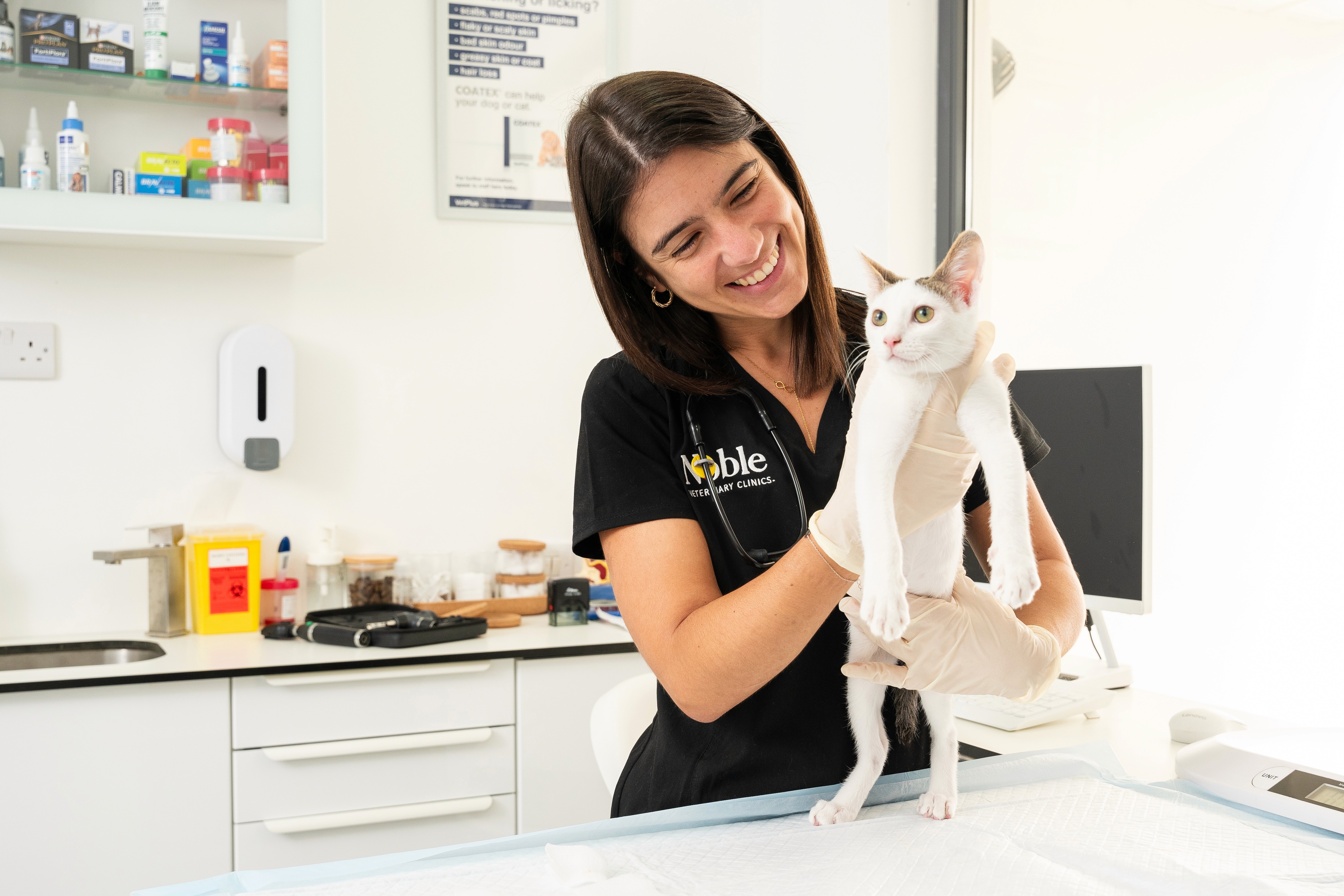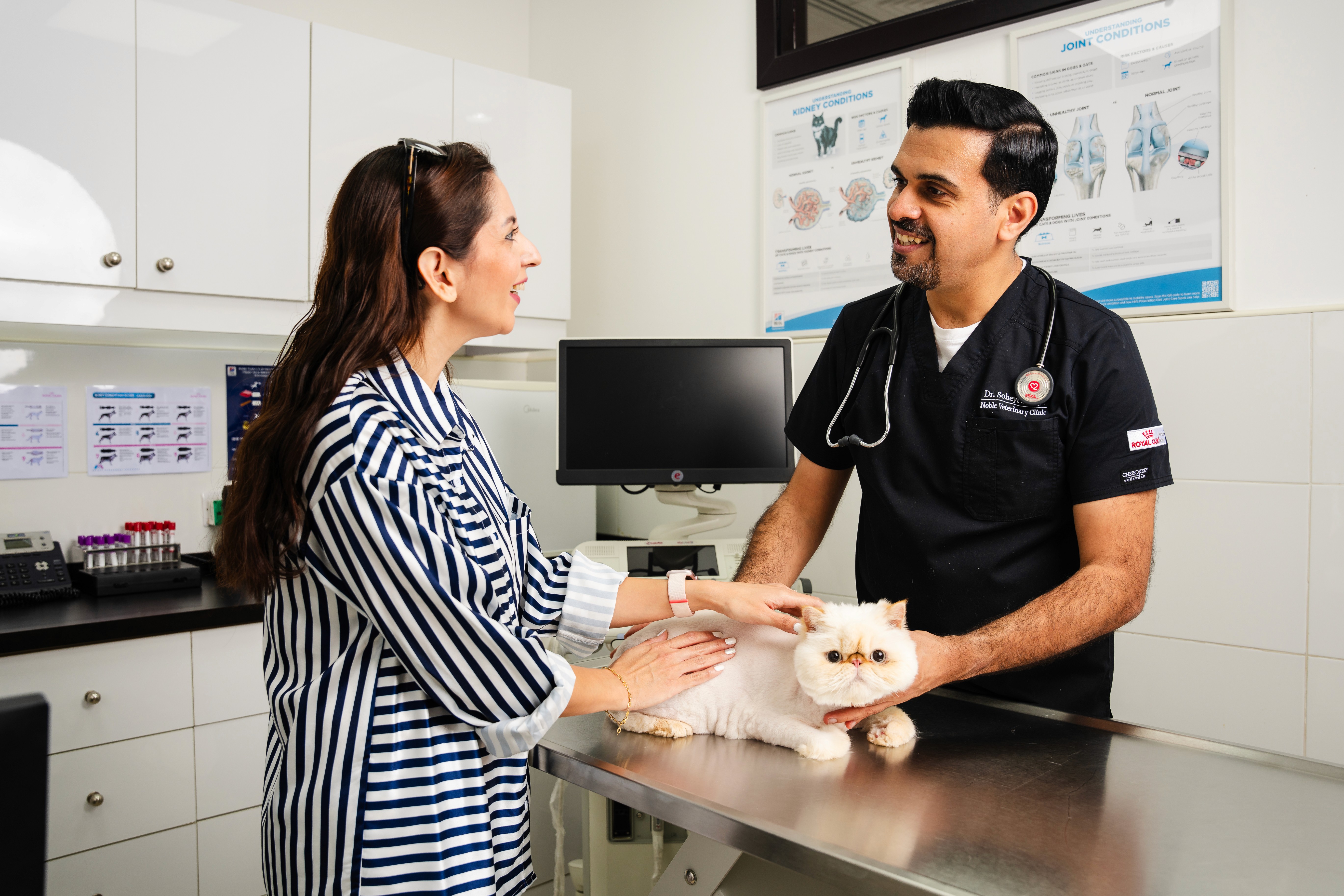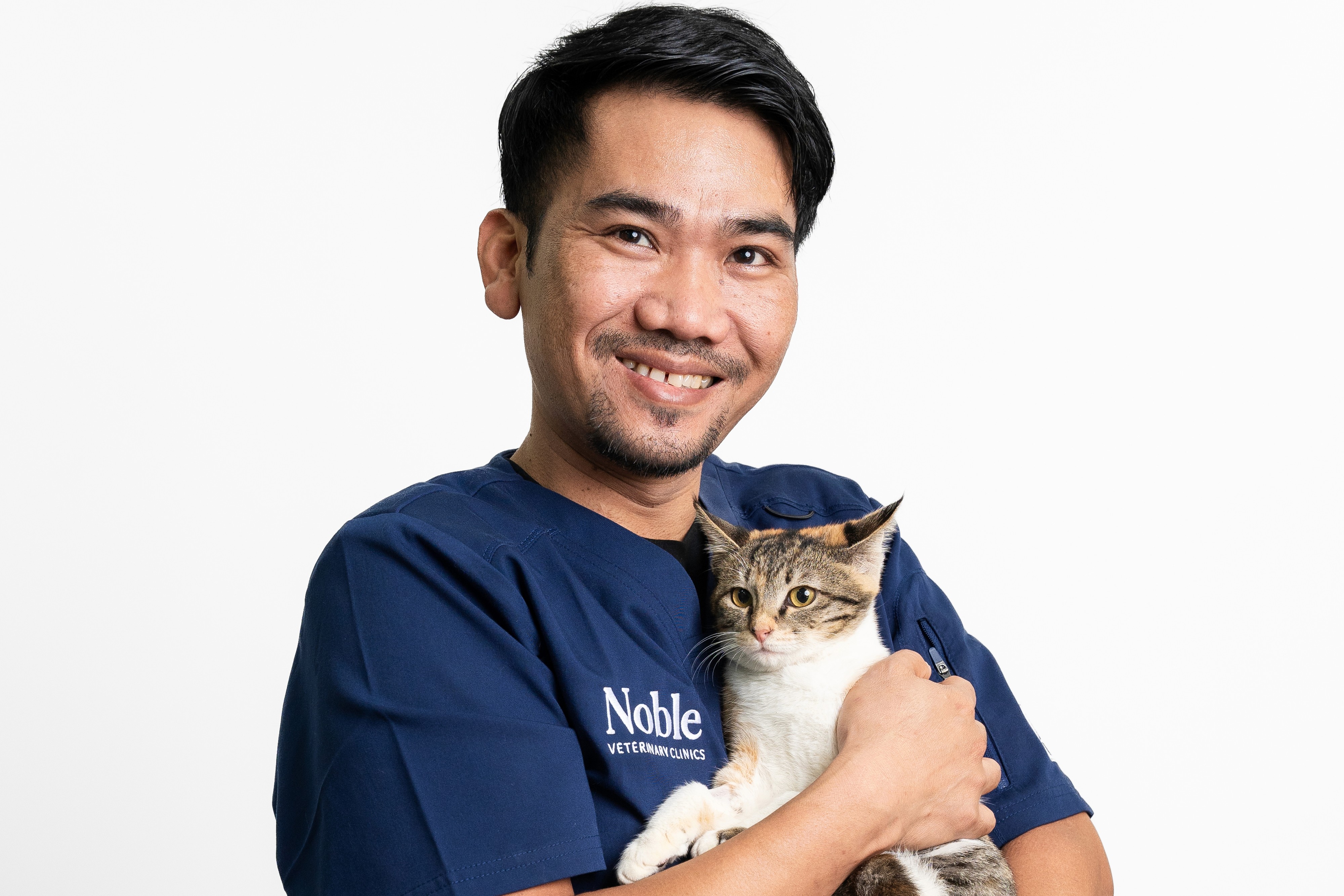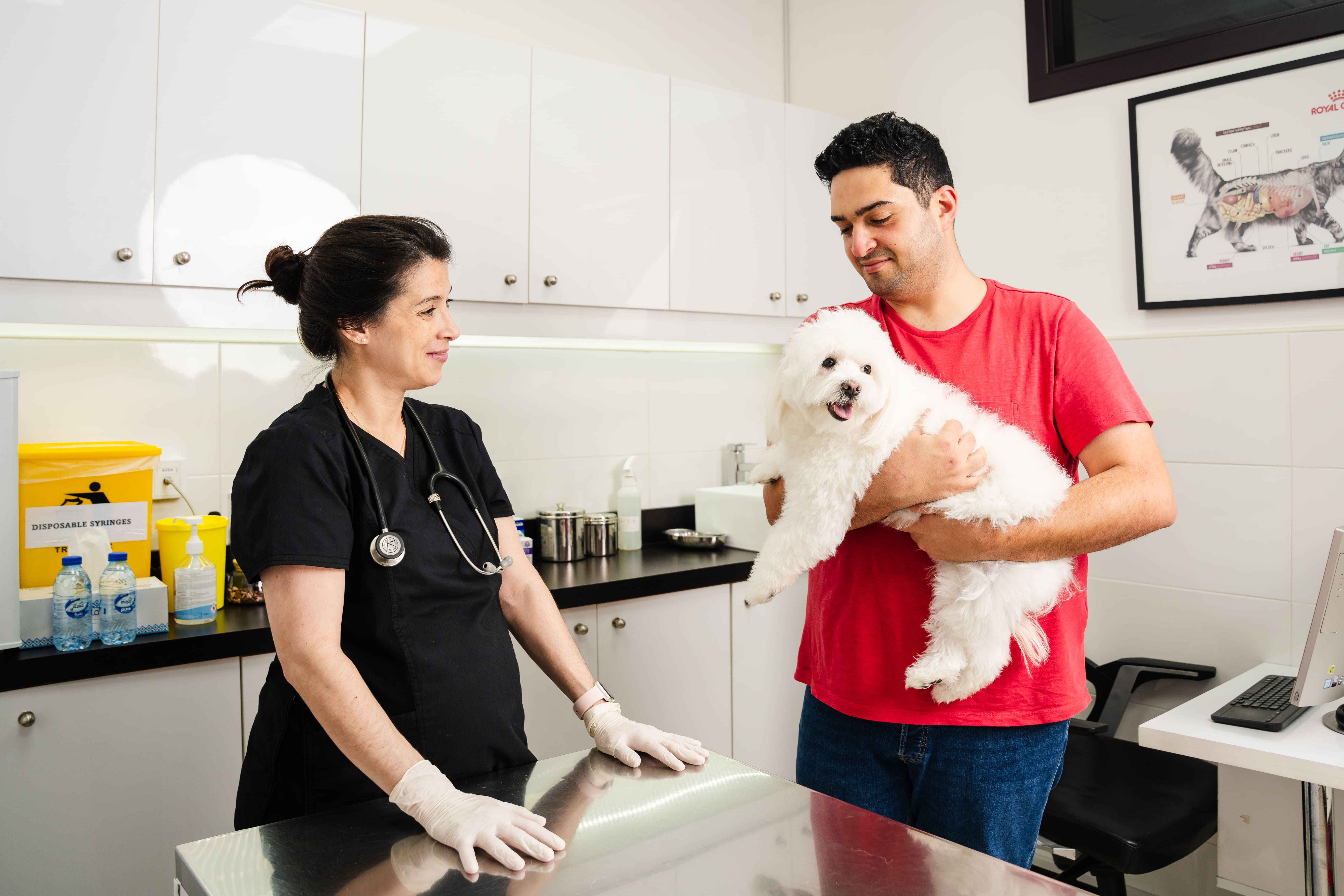Feline immunodeficiency virus affects cats of all ages. FIV weakens a cat’s immune system, which makes it harder for them to fight off infections.
The virus most commonly spreads through deep bite wounds, which means outdoor cats or cats that get into fights are at a higher risk. Luckily, FIV doesn’t spread easily through casual contact. So, you don’t need to worry about it being transmitted through simpler interactions within cats.
However, the virus is still serious. Taking the steps to protect your cat will be beneficial in the long run.
Here's everything you need to know about FIV in cats.
What is FIV?
FIV is a retrovirus in cats that affects their immune system. It’s similar to how HIV works, but FIV is species-specific. This means it only affects cats and can’t spread to humans, dogs, or other animals.
The virus invades their white blood cells when it gets into the cat, which are crucial for fighting off infections. Over time, the immune system becomes weaker, which means the cat will have a much weaker defense. While this doesn’t mean that cats with FIV are always sick, it just means they need extra care to stay healthy.
How Does FIV Spread in Cats?
The virus spreads mainly through bite wounds. This happens when saliva is introduced into the bloodstream through a cat's bite. These bites usually occur during fights, especially when cats are defending their territory.
In some cases, an infected mother may pass FIV to her kittens during pregnancy or through her milk while nursing. However, this form of transmission is relatively rare compared to bite wounds.
What are the Stages of an FIV Infection?
FIV progresses in three stages, each with its own set of symptoms. These stages are the acute phase, the asymptomatic phase, and the progressive immune dysfunction phase. Each stage is unique and shows signs of the progression of a cat’s FIV infection.
Here are the stages of an FIV infection.
Stage 1: Acute Phase
The acute phase of FIV occurs within 1 to 3 months of infection. This is when the virus first enters the body and begins replicating. During this phase, the immune system attempts to fight off the virus, leading to mild or temporary symptoms. Some cats recover quickly and appear healthy again as the virus transitions to the next stage.
Here are the symptoms in the acute phase:
Fever. A low-grade fever is often one of the first signs, though it may go unnoticed.
Swollen Lymph Nodes. Enlarged lymph nodes, which may feel like small lumps under the jaw or in the groin, are a key indicator.
Lethargy. Cats may seem less energetic or prefer sleep more than usual.
Loss of Appetite. Reduced interest in food leads to slight weight loss.
Minor Infections. Cats may develop mild infections, such as sneezing or skin irritations. This is when the virus begins to impact the immune system.
Stage 2: Asymptomatic Phase
The asymptomatic phase is the longest phase of an FIV infection. Also called the latent stage, this phase is the longest and can last for months or even years. During this time, the FIV lies dormant in the cat’s body and replicates at a slower rate. The infected cat will often show no obvious signs of illness.
In most cases, there are no visible symptoms during this stage. Cats may appear completely healthy. Some cats might show very subtle signs, such as occasional fatigue or minor weight loss. But these are often dismissed as normal fluctuations.
During this stage, the virus is still active and may be slowly damaging the immune system. FIV-positive cats can still transmit the virus to other cats, even if they seem healthy.
Stage 3: Progressive Immune Dysfunction Phase
In the final stage, the cat’s immune system becomes extremely weakened. As a result, cats with FIV start to develop symptoms related to opportunistic infections and illnesses.
Here are the symptoms of the progressive immune dysfunction phase:
Chronic Infections. Respiratory, skin, and urinary tract infections can all cause differentiating symptoms. These conditions can cause coughing, sores, and pain.
Weight Loss and Wasting Syndrome. Cats may lose weight even when they eat normally. This can be seen in a loss of muscle mass as well as a poor coat condition.
Gastrointestinal Issues. Chronic diarrhea and vomiting are common in the advanced stages of FIV.
Oral and Dental Issues. Mouth ulcers, tooth loss, and gingivitis in cats can all cause inflammation to the gums and mouth. This results in severe discomfort for cats.
Neurological Symptoms. Seizures, tremors, behavioral changes, increased vocalization, and difficulty walking are some of the neurological symptoms associated with advanced FIV.
Cancer. Cats with advanced FIV are at an increased risk of developing cancers, such as lymphoma.
How is FIV Diagnosed in Cats?

Specialized tests will be used to diagnose FIV in your cat. These tests focus on identifying antibodies or genetic material specific to FIV. Doing so provides a clear picture of your cat’s infection status.
Here are the key tests used for FIV diagnosis:
ELISA Test
The ELISA test is the most common and widely used method for screening cats for FIV. This test works by detecting antibodies in the blood that are produced when a cat’s immune system responds to the virus. A small blood sample is collected from the cat and analyzed, often right at the clinic. Results are typically available in a few minutes.
ELISA is especially useful because of its ability to detect FIV infections relatively early in cats.
Western Blot Test
After the ELISA test, we'll proceed to a Western blot test. This test is a more specific method for detecting FIV antibodies. A blood sample will be studied at a specialized laboratory to conduct the test. This test works by identifying specific antibodies associated with FIV, which can reduce the chance of a false positive.
The Western blot test provides a higher level of accuracy, but it does come at a cost.
PCR Test
The PCR test takes a different approach to diagnosing FIV. Rather than checking for antibodies, the test identifies the genetic material of the FIV. PCR is capable of detecting infections earlier than antibody-based tests. This is because it focuses on the virus rather than on the immune response.
How is FIV in Cats Treated?
Treating and managing your cat's FIV involves treating symptoms. We'll also work to prevent secondary infections and provide supportive care to maintain your cat’s overall health.
Here’s how we treat and manage your cat’s FIV:
Managing Symptoms
FIV weakens the immune system, making infected cats more vulnerable to secondary infections caused by bacteria, viruses, or fungi.
Antibiotics and Antifungal Medications. These are used to treat common infections such as respiratory illnesses, urinary tract infections, and skin conditions.
Pain Relief and Anti-Inflammatories. Cats with dental disease, gingivitis, or mouth ulcers may need pain management to eat comfortably.
Nutritional Support. A high-quality, well-balanced diet is essential to support a cat’s immune system and overall well-being. Some cats may benefit from appetite stimulants or specific therapeutic diets.
FIV-positive cats are more susceptible to recurring infections. So, be sure to watch for early signs of illness, such as lethargy, low appetite, or changes in behavior. Consult with us if you need any help.
Lifestyle Adjustments
To help improve your cat’s life, a couple of lifestyle adjustments will make all the difference.
Keep Your Cat Indoors. If your cat has FIV, staying indoors reduces their exposure to infectious agents. This minimizes the risk of spreading the virus to other cats.
Clean and Safe Home. Maintain a clean home, including food and water bowls, litter boxes, and bedding. Providing enrichment like toys, scratching posts, and cozy resting areas helps keep cats mentally and physically stimulated.
Minimizing Stress. Cats with FIV are more susceptible to illness when stressed. A calm, stable environment with predictable routines is key to their health.
Regular Checkups. Checkups are essential for monitoring your cat’s FIV condition. Tests such as a complete blood count, urinalysis, and a serum biochemical analysis will be included.
Regular Checkups
Checkups are essential for monitoring your cat’s FIV condition. Laboratory tests like a complete blood count, urinalysis, and a serum biochemical analysis will be done to check up on your cat.
How to Protect Your Cat Against FIV?

While there’s no guaranteed way to eliminate the risk, one effective way to protect your cat is to keep it indoors. FIV is primarily transmitted through bite wounds, which can happen when cats fight. So make sure your cat is safe inside.
Since there isn’t a vaccine currently available for FIV, the most effective way is to physically protect your cat.
Unneutered male cats are more likely to fight with other cats, especially other males. This increases the risk of FIV transmission. Spaying or neutering reduces aggressive behaviors, such as fighting and roaming. This lowers the likelihood of exposure to the virus.
Our cats rely on us for love and protection. Showing how much we care starts with how we keep them safe.
FAQs About FIV
How long can a cat live with FIV?
Many FIV-positive cats live normal lifespans, especially with proper care and a stress-free environment. While some may develop complications, regular vet checkups and preventive measures can help them stay healthy for many years.
How do I know if my cat has FIV?
The only definitive way is through diagnostic tests. However, some of the common signs include frequent infections, weight loss, oral health problems, and swollen lymph nodes.
Can a cat with FIV live with other cats?
Yes, an FIV-positive cat can live with other cats as long as they do not fight. FIV is mainly spread through deep bite wounds. As long as these cats don't fight, everything should be okay.
Conclusion
Feline immunodeficiency virus can be challenging to deal with. The virus attacks our cats and makes them weaker and prone to other diseases. Because of this, it's important to be here with our cats.
If your cat is already dealing with the virus, make sure to provide regular checkups, a safe environment, and lots of love at home. All these make a difference in improving your cat's health and life.
Share






